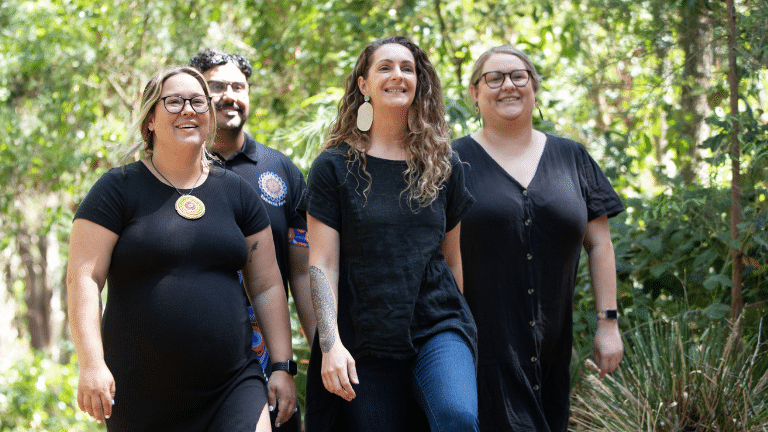
Early Career Researcher of the Year 2022, Associate Professor Michelle Kennedy from the Equity in Health and Wellbeing Research Program, is driving a fresh new way of conducting community-based research – and the results are closing the gap.

Michelle’s journey into academia was as much a happy accident as it was the greatest wish of ‘Bapu’, her Wiradjuri grandfather who didn’t get to go to high school.
“Bapu always told me that we had privilege that other mob didn’t have so we need to do work that’s useful. That’s driven a lot of my choices,” Michelle said.
After doing a Bachelor of Arts (Honours) at the University of Newcastle, she completed a Masters in Social Science and went on to work in social work while also becoming a mother to her three children.
“Around that time, I suffered some major losses. My dear friend (uncle) died of a brain aneurysm at 49 and my grandfather died suddenly. I needed something to keep myself busy. A Research Assistant (RA) job came up that sounded great because it was family-friendly and my kids were only one, three and five at the time.”
The job saw her going out into her community and collecting stories from local Aboriginal and Torres Strait Islander women about smoking and becoming pregnant, something she found easy as she had long-standing connections.
“I grew up on Worimi country in Medowie. As an active community member and a social worker I had both strong community connections and no problem having honest and non-judgemental conversations. Yarning with women is what I’ve been doing my whole life. It helped that I was a smoker before I had my kids and I’ve worked on Awabakal and Worimi country my whole career. I conducted interviews everywhere from caravans to the local park pushing kids on swings.”
She wasn’t working as an RA for long before she was approached to do a PhD. Michelle says she didn’t even really know what a PhD was, or why she would do one.
“I spoke to my mentor and she encouraged me to go for it. She said I might not use it now but it would help me in the future and give me new skills, so I took the leap.”
Michelle’s smoking cessation research found that women preferred a suite of options including app-based and text message-based supports, as well as group-based support. She is currently co-designing what a group-based support could look like with the local Awabakal community.
Beyond her current NHMRC fellowship for her smoking in pregnancy project, Michelle is also working on a broader program called the Koori Quit Pack, which is a mail out program that includes a range of tools including Nicotine Replacement Therapy (NRT) such as patches and gum.
Growing up, Michelle says that she had never met an Aboriginal scientist or researcher. “If you were smart, you were pushed towards being a school teacher.”
Now, her kids get to meet CEOs, professors and doctors all the time. Her son said to her recently, ‘All Aboriginal people are really successful, aren’t they Mum?’
Michelle says this legacy that would make her Bapu burst with pride.